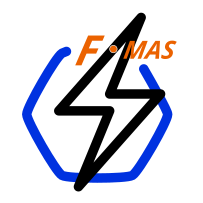Papers with the project acknowledgement
- Olaru, A., Nicolae, G. & Florea, A. M. (2023). The entity-operation model for practical multi-entity deployment, in Proceedings of EMAS 2023, the 11th International Workshop on Engineering Multi-Agent Systems, in conjunction with AAMAS 2023, 29-30 May 2023, London, UK.
 paper
paper
 slides
slides
- Olaru, A. & Pricope, M. (2023). Multi-Modal Decentralized Interaction in Multi-Entity Systems in Sensors, 23(6), pp. 3139.
 paper
paper
- Olaru, A., Sorici, A., Nan, M. & Iancu, D. (2024). AI Folk: Sharing Machine Learning Models in a Multi-Agent Community in Proceedings of DCAI'24, 21st International Conference on Distributed Computing and Artificial Intelligence, 26-28 June 2024, Salamanca, Spain.
 paper
paper
 slides
slides
Presentations
- AI Folk – Building a machine learning culture - presentation during the Management Committee meeting of Cost Action CA19134 - Distributed Knowledge Graphs (DKG), in Malaga, Spain, 26.09.2023
 slides
slides
Deliverables
At the end of the project, we will have developed the following resources:- a domain ontology (in RDF/S) that describes the properties of and relations between four types of resources: individual sensorial observations from devices; datasets formed of multiple observations within a specific context (e.g. images of roads in a given area); learning models, together with information about their input, output, and training data; observations regarding the experience of using a model, such as situation in which it was used, performance information, and, if possible to determine, quality of the results. The ontology will focus on autonomous driving and disaster response applications, and it will be delivered together with a methodology of expanding the ontology for other application fields.
- the core ontology is available at aifolk-core-v2.ttl
- the ontology for the self-driving scenario is available at aifolk-drivingsegmentation-v1.ttl
- the ontology for the disaster response scenario is available at aifolk-disaster-response-segmentation-v1.ttl
- the specification of a high-level interaction protocol, that allows actors in the system to search for resources, transfer resources (datasets, models) locally in a manner that is efficient (using compression and incremental updates) and customized (e.g. dimensionality reduction), subscribe to updates, and share experiences with the resources (especially learning models). The protocol is implemented as a RESTful Web Service, encapsulated in a module that offers to actors an API through which they can access functionality.
- a methodology with describes how to develop the appropriate descriptions for ML resources, as well as how to construct queries for searching resources, build based on the experience with the two validation scenarios in the project.
- two prototype applications, in the field of autonomous driving and disaster response. In these applications, autonomous agents deployed in the environment will have the ability to store, search for, transfer, and use resources such as datasets or models.
- a primary architecture for the entities in the framework
- a first version of the AI Folk ontology
- the design of the AI Folk interaction protocol
- FLASH-MAS as the infrastructure that will underpin interaction in an AI Folk ecosystem
The 2023 report presents:
- the architecture of the AI Folk ontology and its instantiation for the autonomous driving scenario
- the design, integration, and deployment of the AI Folk tools, using FLASH-MAS

- experiments with the autonomous driving scenario
- the design of the disaster response scenario
The final report presents:
- the achievements of the project
- description of core ontology and the instantiations for each scenario
- specification of the interaction protocol
- the architecture of the deployment platform
- the AI Folk methodology
- the two application scenarios developed
 Andrei Olaru, PhD, associate professor -- project coordinator
Andrei Olaru, PhD, associate professor -- project coordinator  Alexandru Sorici, PhD, Lecturer
Alexandru Sorici, PhD, Lecturer  David-Traian Iancu, PhD, Lecturer
David-Traian Iancu, PhD, Lecturer  Mihai Nan, PhD, Lecturer
Mihai Nan, PhD, Lecturer  Teodor-Cristian Adam, Master student
Teodor-Cristian Adam, Master student